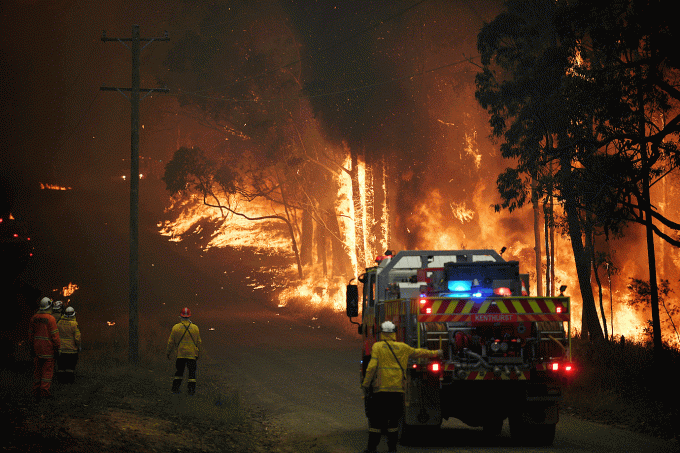How to Overcome Eco-Anxiety in 4 Meaningful Ways

Do you lose hours of sleep with the news of the burning forests of the Amazon and Australia? Are you overcome with an immense guilt when you forget your produce bags or cotton tote bag at the grocery store? Do you break down in tears when you see images of polar bears stranded on an ice float or koalas with severe burn marks? Or feel helpless at the sheer amount of cars still on the roads?
If you’ve answered “yes” to any of the above, you may have experienced what many are calling eco-anxiety. A growing number of people are suffering from this worldwide, and in 2017 the American Psychological Association first defined it as “a chronic fear of environmental doom.” This fear eventually leads one to believe that the planet will no longer exist due to the never ending realities of floods, wildfires, heat waves, deforestation, increasing sea levels, resource depletion, droughts, and so much more.
Interestingly, eco-anxiety is experienced differently depending on where in the world you are. For example, for those that live in places that are immediately threatened by climate change - places such as Venice, Miami or The Maldives - anxiety stems from an existential threat. Will I have a home in the future? Will I have to relocate? Where will I go? For those that are in regions where there is no immediate impact - most places in the Northern Hemisphere - anxiety stems from a general unknown. What will happen? What about my children? What will my future look like?
According to a recent Gallup poll, 62% of Americans worry a fair amount on global warming, up from 51% back in 2004. So while there are those that flat out deny climate change is even real, studies suggest that in fact people are increasing their awareness and are starting to pay more attention, and for many getting nervous about it.
As a result, a new branch of psychology called ecopsychology has emerged in recent decades. Ecopsychology studies the interaction between human health and the natural environment. It claims that our relationship with Earth is critical for our overall well-being, including physical and emotional. A disruption into this relationship causes stress and eco-anxiety.
So how do we manage the stress, anxiety and depression from the uncertainties that stem from climate change?
Here are 4 steps to get you started:
- Lifestyle Changes
- You’ve probably heard them before, but making meaningful changes to your daily habits will help reduce your carbon footprint. Some to try are: eating less meat and dairy, reusing instead of buying new, driving less, cutting back on flying (take the vacations but opt for more staycations or use public transport to get there).
- Make your Home Energy Efficient
- Energy use in homes accounts for 12% of total U.S. greenhouse gas emissions in 2017. There are countless ways to make your home more efficient, and to hopefully lower the percentage of greenhouse gas emissions. Some include: better insulation (to avoid drafty windows and doors), using LED lighting, retrofitting your appliances (fridge, toilets, etc) turning down the heat while you’re at work or at night (while sleeping), turning off the AC when you’re not in the room, wearing more layers indoors, and unplugging electronics when not in use.
- Become an Unofficial Custodian of Green Spaces Near You
- The European Union recently collected data (inspired by the UK’s 2014 MENE study) that found a quantifiable link between nature and well-being. They identified that people who spent 2 hours per week within nature felt better than those that did not. So now that we have a “nature dosage,” how about we all do our part to ensure that these spaces are kept accessible and clean? Some things to consider: sign up for a cleanup day, pick up trash you find and dispose of it properly, report any vandalism you find, etc.
- A Collective Problem Requires Collective Solutions
- Find a community of like-minded people, to share tips and carry the weight of your fears and anxiety together. And once you’ve found this community, start lobbying together! Talk to your politicians - demand that they invest in environmental policies. Change the system! Don’t feel helpless thinking that your individual changes aren’t enough. They are, and they can build a domino effect to inspire and change others. Remember, there is power in numbers!
The goal here is to align your feelings with your actions - understand and acknowledge what you’re feeling. And oh, by the way, feeling concerned about the state of the planet doesn’t make you weak. It is perfectly acceptable to have these thoughts, but acting upon them will help alleviate the weight and ‘burden’ of them.
There has been lots of noise towards the media for over exposing us to stories of natural disasters, growing populations, resource depletions, and environmental decline. The truth of the matter is that the state of the environment is very important for our overall well-being. And while it may appear that your individual choices have no impact in fighting climate change, your voice resonates loudly. Never before have we been more connected with each other. While you may think no one is listening or watching, they are indeed. Make your voices heard and stand up for Earth!










Comments on this post (2)
xdjITzeSRWkprMA
— WgfIMsbxXylZn
dGeYyJVqjkwp
— VDsuJjQvWrMt